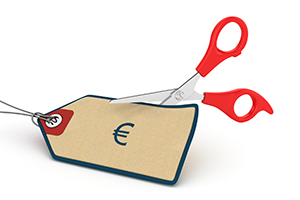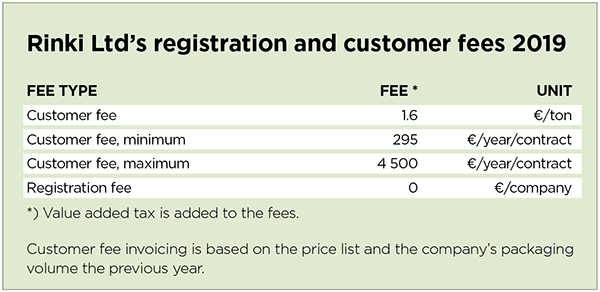An overview for 2019: Lower recycling and customer fees

– We have a good situation as the recycling fees for many materials will decrease next year. This will apply to glass, plastic and some paper fibres. The recycling fee for metal packaging will remain unchanged, while the fee for wooden packaging will increase slightly. Rinki’s customer fee will also decrease, says Juha-Heikki Tanskanen, CEO of Finnish Packaging Recycling RINKI Ltd.
The cost payable by the companies for the producer responsibility will be reduced by 7 per cent, or 750,000 euros, compared with this year if the amount of packaging used remains at the same level. This year the cost to customers will be approximately 17.1 million euros, compared with 20.7 million euros last year. This means that the costs will come down for the second year in a row.
– The main reason for the lower costs is that the transitional phase caused by the extension of the producer responsibility is now over. In 2015 and 2016, we moved from partial producer responsibility to full producer responsibility, which meant, among other things, that the collection of consumer packaging became the producers’ responsibility. The period of change is now over and, together with the producer organisations, we have created an effective system for collecting consumer packaging, Tanskanen explains.
Logistics optimisation is an ongoing effort
The collection of consumer packaging is carried out efficiently in terms of logistics, but there are still a few things to do. The Rinki eco take-back point network has more than 1850 take-back points for carton, glass and metal packaging as well as 550 take-back points for plastic packaging across Finland.
– There are about 7500 collection containers at the Rinki take-back points, which are emptied by 25-30 refuse lorries. The transportation operations are divided into contract areas, which go through invitations for tenders every 3-5 years, which guarantees high levels of performance. A total of 36,000 tonnes of consumer packaging were collected through the Rinki eco take-back point network in 2017, and the volume is growing significantly.
According to Tanskanen, optimising the collection logistics means constantly controlling the quality and the costs.
– The take-back points must be kept in good condition. The importance of quality is highlighted, in particular in the supermarket yards where Rinki take-back points are placed. If the containers are too full when they are emptied, it leads to litter scattering around them. Determining the right time for emptying the containers requires optimisation and management of a large amount of data.
Rinki has started to weigh the collection equipment, which allows for the calculation of the optimal frequency for emptying the containers.
– We have optical devices that we can use for real-time monitoring of the containers as they fill up. We use them in the Helsinki metropolitan area, but their widespread use is not yet economically viable.
The producer responsibility requirements continue to tighten
The new EU waste management directives for waste and packaging waste will bring new requirements for producers. The recycling requirements will tighten while the method of calculating the recycling rate will change and make it more difficult to achieve the targets. Another new feature will be the minimum requirements for the implementation of producer responsibility.
– The tightening of the requirements means additional work and, consequently, added costs. The changes must be implemented efficiently so that we can curb the costs. The changes will come into force in Finland in the summer of 2020.
Does your business partner meet the producer responsibility?
Tanskanen explains that the scope of producer responsibility will expand because politicians have realised that it is a good way to ensure that the environmental objectives are achieved. There are already 4400 companies in Finland that bear producer responsibility for packaging.
– It is important that all the companies subject to producer responsibility are included in the scheme. For example, foreign online stores and some Finnish companies are not yet in the system, which means that they do not pay their share of the costs.
Rinki is proactive in new customer acquisition, but it is still not enough.
– Companies could require their suppliers to prove their compliance with the producer responsibility in the same way as they expect their suppliers to look after their tax obligations. The more companies are involved, the smaller the fees for all, says Tanskanen.

